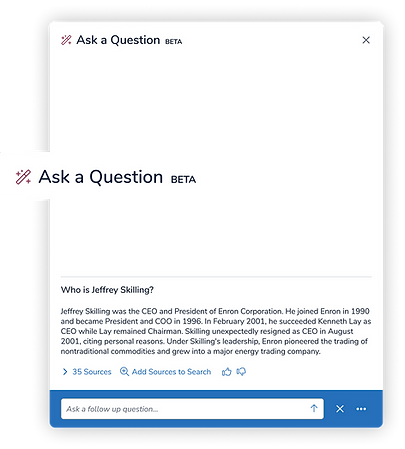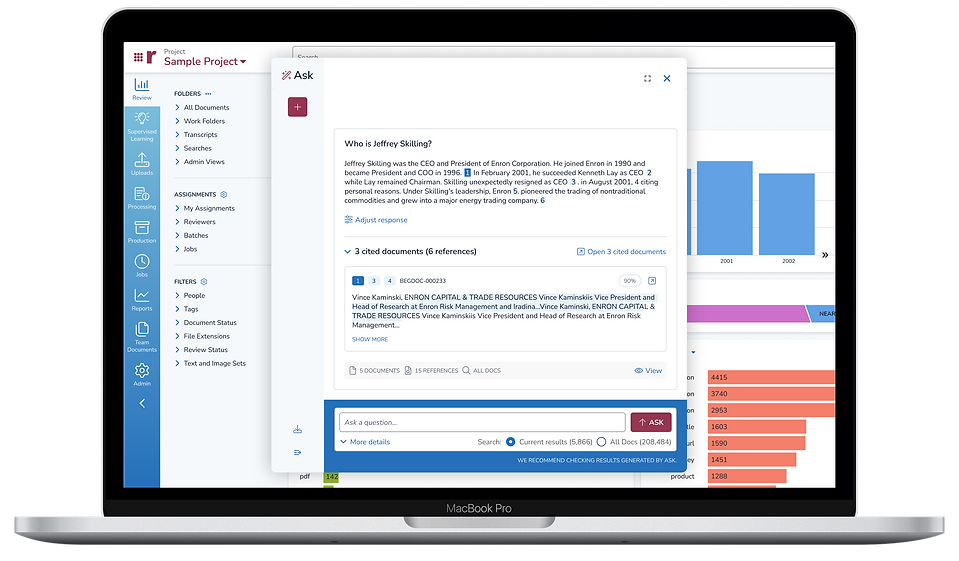Gen AI: Designing Intelligent Legal Review
Role: IC Lead Product Designer
Company: Reveal
The Team: Product, Engineering, Data Science, Executive team, Quality Assurance.
User Goal: Legal professionals want to leverage intelligent and intuitive search technology to quickly and accurately discover relevant evidence within large datasets, minimising manual review and ensuring no crucial information is missed.
Business Goal: To drive business growth by providing legal professionals with an AI powered search solution that minimises manual review and accurately identifies evidence, positioning Reveal as a leader in efficient legal discovery.
Outcome: Ask AI Streamlines Legal Review with Natural Language Search and Transparent Citations, Delivering Dramatic Efficiency Gains.

To manage exponential data growth, legal teams need efficient, simplified search to reduce evidence loss and cost escalation.
Data & Search Inefficiencies:
-
The sheer volume of electronically stored information (ESI) is exponentially increasing, creating an overwhelming challenge for legal professionals.
-
In today's litigious environment, the ability to quickly and accurately find relevant information is no longer a luxury, it's a necessity, and current search methods are failing to meet this critical need.
-
Keyword and Boolean search methods are inadequate and inefficient for the complexity of legal language and large datasets.
Legal Language & Interpretation:
-
Traditional search methods can fail to grasp the nuances of legal language, including complex terminology, subtle distinctions, and implied meanings.
-
Keyword searches can miss crucial information if a document lacks the precise keywords used.
-
Legal professionals can sometimes struggle to craft effective queries, often with limited success.
-
Failure to identify relationships or interpret intent results in missed evidence.
Negative Impact on Legal Processes:
-
Missed evidence can negatively impact case outcomes, leading to unfavourable judgments or settlements.
-
Time consuming manual review drives up costs, placing a significant burden on legal teams.
-
The inability to quickly and accurately find information is a critical failure in today's legal environment.
Contextual background:
I joined Reveal following its acquisition of Logikcull in the summer of 2023. At Logikcull, I and a small team of data scientists began exploring the potential of generative AI in e-discovery. This involved user interviews, research, and collaboration with internal data scientists and industry experts.
After joining Reveal, I was tasked with leading the design of "Ask," their innovative generative AI project. While some initial concept work had been done for a BETA, significant improvements were needed to make Ask practical for real world discovery cases, which is where my contribution began.

Ask Gen AI MVP Beta
Comprehensive research identified key user needs, driving ASK's strategic improvements.

Targeted User Interviews.
To efficiently gather user insights from key global accounts, I collaborated with the VP of Product and Customer Success Managers to select participants. I then implemented a self-service scheduling system using a public calendar link, enabling users to book 1:1 research sessions at their convenience. This facilitated targeted interviews, yielding direct feedback on user experiences and requirements.
Holistic Understanding of Product Use Cases.
To develop a holistic understanding of current use cases and identify potential improvements, I facilitated collaboration with internal stakeholders and industry experts. This was supplemented by gathering insights from customer-facing teams, including Customer Success, Support, and Sales.
Market research and competitor analysis
In addition to user research, ongoing competitive and market research was conducted to provide context and identify industry trends, informing product strategy and development. The generative AI landscape is evolving rapidly which requires constant tracking in order to inform product decisions.
AI-enabled research knowledge sharing for the organisation.
Beyond informing design and product decisions, effectively communicating the research findings and the "why" behind features was crucial. To achieve this, I created knowledge-sharing documentation and utilised AI powered Zoom and Gong summaries and repositories. I also presented my findings to the entire product team, fostering broad understanding and alignment.

User stories and requirements

As a legal professional, I want . . .
-
Ask to provide answers with clear citations and relevant document excerpts for verification.
-
Ask to allow the selection of document sets/timelines and generate summaries for targeted information retrieval.
-
To easily open cited documents in the viewer and fullscreen expansion.
-
Ask to facilitate chat history management, downloads, and sharing for collaboration and record-keeping.
-
To be able to give feedback on responses and be provided with initial prompt suggestions for improved queries.
-
To have access to view and download session logs for monitoring and troubleshooting.
We improved the user experience and flow by incorporating chat history, document citations, and chat downloads.
To improve the user experience, we looked to add several features to the Ask interface. Users should now be able to ask new questions and view their chat history. After a conversation or review, users have several exit options: open cited documents, download the chat, or simply close and exit Ask.

A user-centred redesign of "Ask" prioritizes clarity, control, and legal defensibility through improved search, instructions, chat, and citations.
Search scope
I simplified search scope selection by adding a radio button, enabling users to quickly toggle between 'Current Results' and 'All Docs' for refined queries, ultimately reducing review time and associated costs.
Additional instructions
To maintain a clean interface while offering advanced question refinement, I nested the 'additional instructions' input under a 'More Details' link, addressing the challenge of displaying two separate input fields due to technical limitations.
Chat history
Responding to strong user demand for conversation resumption, we implemented saved chat sessions within the interface, enabled by recent technical advancements. To manage Ask's evolving complexity, I designed a collapsible left panel for chat history, ensuring accessibility and future menu expansion.







Citation design itterations.
Citations for Legal Review
Legal professionals require defensible AI outputs. Ask addresses this by providing citations with document samples, seamlessly integrating with existing review workflows. Through collaboration with industry experts, we iteratively refined the citation format, focusing on usability and accuracy.
-
User submits a question.
-
Ask generates an answer with supporting citations.
-
User selects a citation to view the corresponding document.
-
User opens cited documents in the document viewer for manual review.
Generative AI, coupled with citations, enables legal professionals to condense vast document sets, potentially millions, into a focused selection in mere minutes.

Prompt libraries simplify AI use for legal professionals in "Ask".
Conversations with users and trainers of Ask revealed an opportunity to enhance the initial user experience. Despite general awareness of generative AI, many legal professionals lack a clear understanding of its practical applications within their field. To address this, I began investigating the potential of "prompt libraries" and "suggested prompts." The goal is to enable account owners to import or create collections of valuable and relevant prompts, providing their users with a helpful starting point for discovery during litigation.

We explored integrating prompt recommendations into the "Ask" modal for first-time users. Upon loading, users would see general prompt ideas, and a "type" menu would allow them to filter for more specific categories, such as Subpoena, FOIA requests, or Employment disputes.

Incorporating session logs to enhance Generative AI defensibility.
To enhance defensibility in court, we explored incorporating a session log that tracks Ask usage and allows admins to view and download conversation reports within specified date ranges and for specific users. This would be invaluable for supporting findings derived from Generative AI-assisted review. I designed two versions, one as a dedicated screen, and another as a modal accessible from anywhere within the product, subject to user/admin permissions.





Ask AI streamlines legal review with natural language search and transparent citations, delivering dramatic efficiency gains.
Before:
Overwhelming data volumes: Electronically stored information (ESI) is growing exponentially, overwhelming reviewers.
Slow and inefficient review: Existing search and review practises can still be time consuming even with assisted review.
Inadequate search methods: Users rely on exact match Keyword and Boolean search, which are inefficient for complex legal language and large datasets.
Missed evidence: Failure to identify document relationships or interpret intent leads to critical evidence being overlooked.
Lack of chat history functionality: Users cannot view, download, or produce their chat history.
Incomplete Gen AI UX: Without citations, Gen AI answers still require further manual investigation by users.
Expensive Gen AI search: Users can only search entire document sets and cannot limit the scope to sub searches which results in high costs.
After:
Natural language search: Users can now ask questions in natural language, avoiding complex Boolean searches or keyword guessing.
AI-Powered Summaries: Users can now generate concise, easy to read summaries of a large document sets saving hundreds of hours.
Targeted Results: With citations, users receive precise, document supported answers tailored to specific questions.
Source Transparency: Users can see a ranked list of source documents with snippets of text used to generate the answer, allowing for verification and easier defensibility.
Data Control: By selecting specific datasets, from an entire collection down to a single custodian, users can control the scope and cost of Gen AI searches.
Chat History: Ask now saves recent conversations and results for later use, making longer case reviews easier to resume.
Downloadable Results: Users can download a complete list of questions, answers, sources, and more, making Gen AI for e-discovery more defensible.

How K2 used Reveal’s ASK to Create Efficient & Robust Briefs for a Multi-Million Dollar Construction Arbitration
Facing a one-week deadline for a multi-million dollar construction arbitration closing brief, K2 leveraged Reveal's ASK technology to efficiently process over 3,000 documents, resulting in a 65-page brief containing 250 precisely integrated citations.
Utilising Ask and a streamlined approach, K2 yielded a 360% increase in time savings efficiency, completing the brief in days rather than weeks, and significantly reduced review costs.
The firm praised the streamlined process, the accuracy of ASK in identifying key documents, and the comprehensive handling of evidence, ultimately delivering a persuasive and well-supported brief within the tight deadline.
Ask will evolve with user feedback, focusing on transparency and defensibility in AI-powered legal search
The expanding capabilities of generative AI offer exciting possibilities for Ask's growth. User feedback and ongoing research by our data science team will drive a continuous cycle of new features and improvements.
A key focus will remain on refining the user experience, particularly how we connect users with relevant documents. Our goal is to make natural language search easy, fast, and efficient. While AI won't replace legal professionals, this assistive technology can be incredibly powerful. We've heard firsthand from users that building confidence in the technology, and specifically in Ask, hinges on defensibility. Users need to understand how certain documents, decisions, and outcomes were derived.
Generative AI in legal tech cannot be a "black box." Therefore, we need to empower users to understand and audit the information Ask produces.
